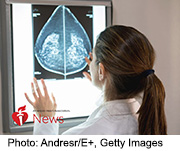- Could Your Grocery Store Meat Be Causing Recurring UTIs?
- Are You Making This Expensive Thermostat Error This Winter?
- Recognizing the Signs of Hypothyroidism
- 10 Strategies to Overcome Insomnia
- Could Artificial Sweeteners Be Aging the Brain Faster?
- Techniques for Soothing Your Nervous System
- Does the Water in Your House Smell Funny? Here’s Why
- Can a Daily Dose of Apple Cider Vinegar Actually Aid Weight Loss?
- 6 Health Beverages That Can Actually Spike Your Blood Sugar
- Treatment Options for Social Anxiety Disorder
AHA News: Scientists Find Biological Link Between High Blood Pressure and Breast Cancer

FRIDAY, Sept. 6, 2019 (American Heart Association News) — Researchers have identified a protein that may be a risk factor for both high blood pressure and breast cancer.
Previous studies have found women with high blood pressure have about a 15% increased risk of developing breast cancer compared to women with normal blood pressure. High levels of the protein GRK4 (G-protein coupled receptor kinase 4) have been shown to cause high blood pressure, also called hypertension. The new study, presented Friday at the American Heart Association’s Hypertension Scientific Sessions in New Orleans, showed the GRK4 protein was present in breast cancer cells but not in normal breast cells.
“Cancer and hypertension share common risk factors,” said Dr. Wei Yue, the study’s lead investigator and a research scientist at the University of Virginia School of Medicine in Charlottesville. “Our laboratory’s previous research on GRK4 found that it is regulated by an oncogene called c-Myc, which plays a role in many cancers, including breast cancer. This led us to hypothesize that GRK4 could be a link.”
Nearly half of all adults with high blood pressure are women. After age 65, women are more likely than men to have high blood pressure. Pregnancy, birth control medications and menopause can all increase the risk of developing high blood pressure. If left untreated, it can cause health problems such as heart disease, stroke and vision loss.
In women, breast cancer is the most commonly diagnosed cancer and the second leading cause of cancer death.
“While previous studies have shown that breast cancer risk is increased in hypertensive women, this study adds to the current knowledge by providing the molecular mechanisms that underlie this association,” said Dr. Vesna D. Garovic, chair of the division of Nephrology and Hypertension Research at the Mayo Clinic in Rochester, Minnesota.
Garovic, who was not involved in the new research, said studies like this one that identify the molecular mechanisms and signaling pathways that cause a disease to develop can provide new insights into treatment options.
Not all breast tumors are the same. The study looked for GRK4 in two specific types of breast cancer, known as hormone-sensitive and triple-negative.
“Our conclusion may not be applicable to other types of breast cancer,” said Yue.
Garovic noted GRK4 genetic variations may not be the same in all racial groups. Studies that look for GRK4 in women with breast cancer across racial and ethnic groups, she said, may provide insights into previously reported race-based differences in tumor type, treatment response and outcomes.
GRK4 is one of seven GRK proteins. Other studies have looked for GRK2 and GRK5 in different types of cancers, but Yue said their group is the first to look for a link between GRK4, high blood pressure and breast cancer. “No one else is working on this,” she said.
Yue said this molecule is unique because it’s not normally expressed – meaning made into a protein by a gene – in breast tissues, making it a potential target for drug development.
“A drug that targeted GRK4 could potentially be used to treat the patients with hypertension and breast cancer.”
Copyright © 2026 HealthDay. All rights reserved.










